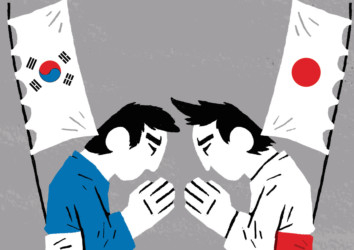
Relations between Japan and South Korea are probably at their worst since the end of the Second World War. Conflicts over territories and past history are nothing new between these Northeast Asian neighbours. But diplomatic and political disputes at the government level are being reinforced by media coverage and internet discussion, hardening public attitudes in each country. There are few signs that bilateral relations will improve anytime soon - even though many people, ourselves included, have tried for years to mend fences.
Unfortunately, a vicious cycle has fuelled the worsening of relations, particularly in the past few months. The deteriorating relationship between the governments of Japan and South Korea stirs mutual antagonism. In turn, popular sentiment on both sides prompts political leaders to stiffen their attitudes toward the other country.
It is as if the Koreans and the Japanese are still fighting Second World War almost seven decades after it ended. Koreans say that Japan is prolonging the war by not facing up to and teaching the truth about the past. Many Japanese blame Korean obstinacy for the continuing quarrel. “We have apologised enough,” many have said. “How many more times must we say we are sorry?” Koreans worry about Japan moving toward the right and the rise of Japanese militarism. The Japanese suspect that Korea is moving away from Japan.
This deterioration is not good for either country — or anyone else. The breakdown weakens alliances in Northeast Asia. Economies in the region and beyond stand to be adversely affected. The escalating feud might produce unintended clashes. Most seriously, it condemns younger generations to more hatred and hostility, making it more difficult for respective governments to promote wise policies.
The situation cannot go on. Japan and South Korea formally share common values of democracy and a market economy. Each has a stake in building peace and prosperity in the region and throughout the world. As neighbours, they must co-exist for centuries to come. Bad relations would seriously affect the interests of not only Japan and South Korea but also other countries, including the US.
The time has come for leaders of both nations to publicly recognise the roots of the problem. Whether for lack of vision or courage, political and intellectual elites in both countries have failed to buck popular sentiments. Japanese leaders should have fully examined their responsibilities of the past. Korean leaders have failed to warn their people of the consequences of their uncalculating displays of emotion.
So, what needs to be done? How to break out of this seemingly endless morass? Just as everyone in the international community has strong stakes in bilateral relations between Japan and Korea, every citizen in both countries — and particularly every leader — has a role to play in improving relations. In this regard, what the leaders do not do is as important as what they do. Here is a short list of recommendations.
First, each side must refrain from actions that the other side would consider provocative. They must not engage or indulge in strategies that undermine the positions of those in the other country, particularly those working to foster better relations. Instead, both sides should recognise and give credit to constructive moves as well as refrain from engaging in destructive moves. Both should act to restrain fervent nationalists.
Leaders must be ready for high-level dialogue rather than creating preconditions that are politically difficult, if not impossible, to meet. They should be creative about finding ways to reduce the risk that leaders on either side could be seen as weak in defending their nation’s interests. They should be aware of the political limitations and requirements of their counterparts while trying their best to meet conditions for dialogue. They should respond positively to efforts made from the standpoint of furthering better bilateral relations.
Both must also recognise that it would be counterproductive for other countries, the United States in particular, to appear to take sides in these quarrels. Instead, they should provide opportunities and create environments that would allow other countries to play a constructive role in bringing Japan and Korea together as friendly and cooperative neighbours.
South Korea should recognise that excessive patriotism is a view of only a minority of Japanese; it does not represent all Japanese. Accordingly, Seoul should take care not to antagonise the Japanese public at large by placing excessive attention on the views of Japanese extremists or by engaging in wholesale criticism of Japan. For its part, Japan should recognise and accept Korea as an equal partner in its economic and political endeavours, not as an upstart competitor to guard against.
Rather than focusing on gaining another apology from Japan, Seoul should try to persuade Tokyo to cooperate in building a happy and confident Korean nation that would help wash away the pains of the past. The two countries should work together to generate positive feelings associated with being good neighbours. Japan should try to help heal wounds rather than aggravate them. Reviving good bilateral relations could be the greatest gift both countries’ leaders can leave to posterity.
— Washington Post
Ogata Sadako is a former president of the Japan International Cooperation Agency and was the United Nations high commissioner for refugees from 1991 to 2001. Han Sung-Joo was foreign minister of South Korea from 1993 to 1994 and is a former president of Korea University. Ezra F. Vogel is a professor emeritus at Harvard University and a former director of Harvard’s Asia Centre.









